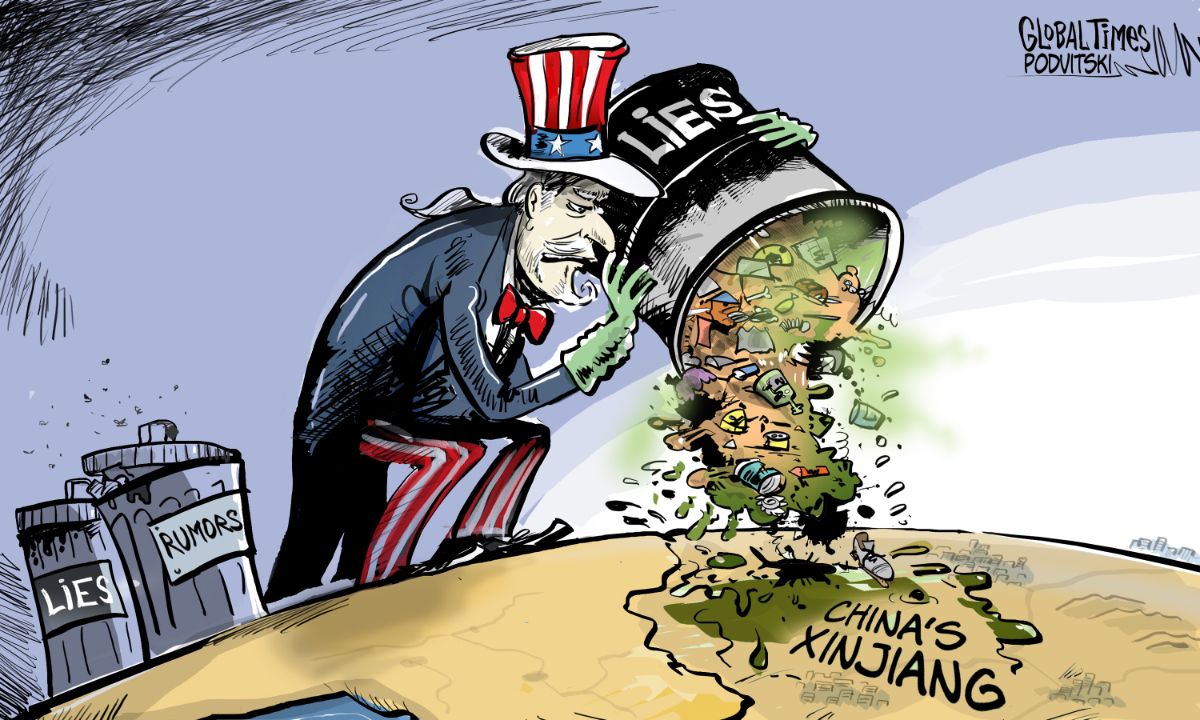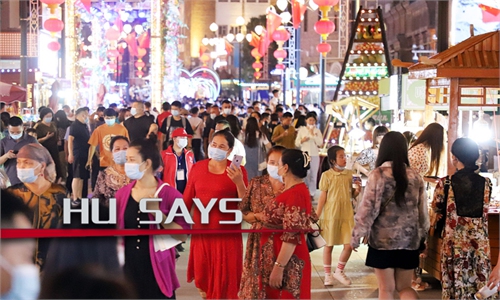
Slandering Xinjiang -- the new normal of the "empire of lies" Illustration: Vitaly Podvitski
Did Washington just accidentally reveal its playbook filled with tactics to block China's justified counteractions over Xinjiang-related issues?The US State Department's Global Engagement Center (GEC) released a report Wednesday accusing China of actively attempting to "manipulate and dominate global discourse on Xinjiang." According to it, China is accused of using its "messengers" to spread disinformation, attack China critics, amplify "positive stories," and so on.
The current round of public opinion warfare between China and the US-led West over Xinjiang arguably began in 2018, when anti-China "scholar" Adrian Zenz's "studies" on so-called human rights abuses in Xinjiang started to attract much attention from the US media and Washington. Now almost five years into this struggle, the US' trick is crystal clear - to use its dominant position in the global discourse and its shamelessness in the geopolitical game to smear and attack China on all possible fronts, at multiple levels, and through various means.
As the West, mainly the US, continues to concoct and spread lies, China's efforts to tell its story over Xinjiang-related issues aim at refuting and stopping the spreading of disinformation, which is far from the complete picture of the situation.
When it comes to Xinjiang-related issues, the West simply doesn't or refuses to understand its complexity. Western countries view this matter through the monotonous lens of human rights and freedom they are so accustomed to. But in fact, China's governance in Xinjiang involves the unity of China's ethnic groups and the combat of separatism, terrorism and extremism - key elements that affect the development and security of the Xinjiang region and the whole country.
The US and Western smears are far from the reality in Xinjiang, and the US State Department has described China's self-defense as "spreading disinformation," which shows their inherent disregard for facts and refusal to self-reflect.
In many ways, public opinion warfare over Xinjiang is a competition for a fair position of global discourse, said the experts. The US wants to destroy China's capability to defend and protect itself in such a contest, aiming to prove its hegemony in global discourse and gain the upper hand when dealing with the rising nation. The final goal is to knock Beijing down entirely so that Washington can act even more recklessly.
According to Lü Xiang, a research fellow on US studies at the Chinese Academy of Social Sciences, when playing the geopolitical game, Washington tends to intensify the attacks against its opponents - Beijing, for example - once it feels like it's in a weak position. Therefore, since the US is deep in political and economic crises, it has chosen to bash China, prompted by a sense of weakness. However, the US has to come to realization that it's futile to push China into any kind of warfare to solve its own domestic problems.
This public opinion warfare is unlikely to end soon. Chinese military observer Wang Qiang told the Global Times that smearing China on Xinjiang-related issues means gaining considerable outputs with few inputs for Washington, be they from the perspective of containing China, maintaining white people's dominant position in the world, or strengthening the West's unity.
As the GEC report proves, the US will certainly continue to step up the smearing of China on Xinjiang-related issues. On the one hand, it would continue to create more barriers for China to speak out. On the other hand, we should not be surprised if it increases the usage of the measures it has accused China of in the report to manipulate global opinion on Xinjiang. Nevertheless, China is ready to make counterattacks and expose the lies from the West one by one. The play has just begun.



